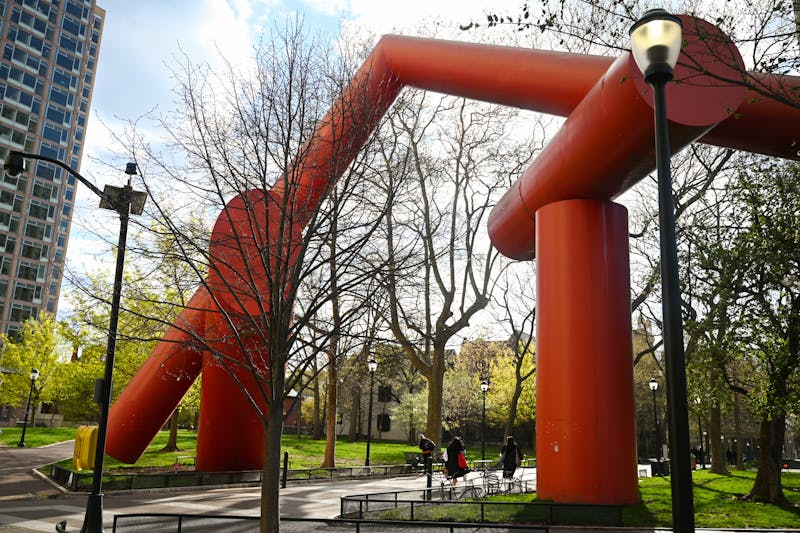
While Donald Trump may be Wharton's most famous alum, Michael Milken is, by many accounts, the most accomplished. By popularizing the junk bond industry, he rose to set the record for highest single-year salary (a record that still stands) but ultimately ended up in jail for violating securities laws. Today, Wharton barely acknowledges his existence.
According to The Daily Pennsylvanian of Sept. 27, 1990, "Milken's portrait, which hung in the Wharton 'Hall of Fame,' was removed last May, one month after Milken reached the plea bargain with prosecutors. Wharton officials declined to comment on the case yesterday." It is a shame that there wasn't, and still isn't, thoughtful dialogue about Milken's accomplishments and ultimate downfall.
Milken has come to represent everything wrong with the financial industry, the Wharton spirit and the 1980s; according to former U.S. Securities and Exchange Commission Chairman Richard Breeden, "He stood at the center of a network of manipulation, fraud and deceit." A simplistic analysis would lead to the conclusion that Milken spearheaded the "Decade of Greed," and some have even said Milken's actions set the stage for the recent corporate scandals.
As a Wharton MBA, Milken did substantial research on what he believed to be an underfunded market: junk bonds, or debt with high stated interest yields. At the time, these were mostly "fallen angels," or bonds of companies that got into difficulties, causing the price of their debt to fall. Even with a higher interest yield, only a few brave investors were willing to buy them. Milken's research concluded that the bonds were underpriced and that their higher interest rates and capital gains more than compensated for the risk.
At the investment bank Drexel Burnham Lambert, Milken began underwriting issues of junk bonds, obtaining financing for companies that would not have received funding otherwise. But the more important revelation came when Milken decided to use junk bonds to finance the takeover of major corporations with inefficient management. In doing this, he rewrote the rules of hostile takeovers and placed shareholder rights at the forefront of management's priorities.
The Economist says Milken is "credit[ed] with fueling much of America's rampant economic growth by enabling companies with bright ideas to get the money they need to develop them." The Washington Post says Milken "helped create the conditions for America's explosion of wealth and creativity." He was the greatest financier since J.P. Morgan, creating a half-trillion dollar market and forever changing the balance of corporate America.
His $550 million salary in 1987 still stands in the Guinness Book of World Records, but he has also ruffled a lot of feathers. Donald Trump, known as neither a socialist nor a hater of capitalism, expressed "amazement ... [that DBL] would allow someone to benefit that greatly," and suggested Milken take a pay cut because he "can be happy with a lot less money."
DBL, largely due to Milken, moved from $1.2 million in fees to over $4 billion in 1986, far and away the most profitable firm on Wall Street. The other investment banks, fearful of tarnishing their blue-chip culture and deeply committed to those in power, stayed on the sidelines when this era of great change occurred. They portrayed Milken as an aggressive raider robbing good, hardworking Americans of jobs. The irony of investment bankers advocating workers' rights above sound economics is striking.
When Milken was charged with 98 securities violations, he plea bargained, which resulted in a $200 million fine and 22 months of incarceration. The lead prosecutor, Assistant U.S. Attorney John Carroll, admitted in 1992 that "we're guilty of criminalizing technical offenses. ... Many of the prosecution theories we used were novel. Many of the statutes we charged under hadn't been charged as crimes before." The six charges he was convicted of were all minor regulatory infractions, totaling $318,000 in economic impact. Immediately, speculation was that the U.S. attorney who spearheaded Milken's prosecution had political ambitions. Perhaps following in the steps of Thomas Dewey, this U.S. attorney was rumored to be dreaming of becoming a senator from New York, mayor of New York City and maybe even president. The U.S. attorney's name: Rudy Giuliani.
My assessment is that, while Milken was certainly guilty of violating stock "parking" and SEC reporting laws, which he admits to doing, his punishment did not fit the crime. Only Milken himself knows what he did, and his long-awaited book describing his side has not come out yet. But none disagree that his financial innovations, philanthropy and founding of the prominent economic think tank The Milken Institute all seal his place as one of the most prominent Wharton graduates ever.
Let's restore Milken to the Hall of Fame, while providing information about his trial and plea bargain, so people can make up their own minds about what happened. That the school still has no official position, that it is still so difficult to get Wharton to comment on Milken, is a shame. Whether as a symbol of Wharton innovation or Wharton greed, Milken deserves to be remembered, for as the philosopher George Santayana said, "Those who cannot remember the past are condemned to repeat it."
Will Guo is a senior in the Huntsman Program for International Studies in Business from Los Angeles. Aim For The Head appears on alternate Mondays.
The Daily Pennsylvanian is an independent, student-run newspaper. Please consider making a donation to support the coverage that shapes the University. Your generosity ensures a future of strong journalism at Penn.
DonatePlease note All comments are eligible for publication in The Daily Pennsylvanian.








